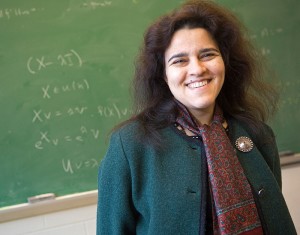
Maria Gordina, associate professor of mathematics in the College of Liberal Arts and Sciences, will spend a semester in residence at Cornell University as the winner of the Ruth I. Michler Memorial Prize awarded by Cornell and the Association for Women in Mathematics.
The award will fund her residency to study infinite dimensional spaces, a research project that involves collaborations with a physicist and two other mathematicians, one of whom was her Ph.D. adviser at Cornell.
Among the questions she will study are the geometry of infinite dimensional curved spaces and random processes in these spaces, such as Brownian motion, a mathematical model used to describe the random movement of particles suspended in a liquid or gas.
A typical example of an infinite dimensional curved space is a “loop group,” which can be visualized as many loops drawn around a sphere or any other curved object.
The Michler prize is named in memory of a young mathematician at the University of North Texas who died in 2000 in a tragic accident when she was a visiting scholar at Northeastern University.
Ruth Michler’s parents established the prize at Cornell because Michler was born in Ithaca when her father, a German mathematician, was visiting the university.
The $45,000 prize honors mid-career faculty women in mathematics and provides an opportunity for them to focus on research, with no teaching obligations.
Currently, Gordina is teaching a graduate class in CLAS on Lie algebras and Lie groups, one of the topics that she studied for her Ph.D. at Cornell under Professor Leonard Gross.
She came to UConn in 2003 after postdoctoral fellowships at McMaster University in Canada and the University of California at San Diego.
Before coming to the U.S. from Russia in 1992, Gordina, who is also known as Masha, was an assistant professor at the Leningrad Electro-Technical Institute.
While at UConn, she has been a Humboldt Research Fellow for three summers. Alexander von Humboldt Foundation fellows are chosen to conduct research at a university in Germany. Gordina worked with Professor Michael Röckner at Bielefeld University.
Gordina’s husband, Alexander Teplyaev, who is also an associate professor of mathematics at UConn, is currently a Humboldt Fellow.
Gordina’s research has been funded by the National Science Foundation.


